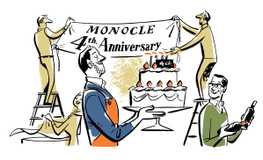Issue 41 / Global
Observation
South Korea used to be sleepy and cautious compared to Asian rivals. But these days it’s causing headaches for business leaders from Singapore to Tokyo. Closer to home, we’re packing up for the our big move.

I’m not quite sure where the first half of Q1 went but I have suspicion that a large portion of it was lost on the frenzied streets of Seoul in mid-January. While Korea’s always been a regular part of our Asia beat (rewind to our K-Pop boy band cover four years ago, our coverage of KAIST, our Expo on the shipbuilding yards of Busan) it’s also started to expand as a market for readers and our retail activities.
My monthly trips to visit our bureau in Tokyo now involve a jaunt over to Seoul to keep an eye on developments in the market. The opening of Haneda airport’s new international terminal has made the journey to Seoul’s Gimpo one of the most pleasurable short hops in Asia and the compressed journey also reveals the stark differences between a mature economy such as Japan’s and an aggressive, hungry one like South Korea’s.
In 2006, when I first visited Seoul for Monocle, you could feel the sense of scrappiness about the place. Casual meetings with the major Korean brands turned into involved fact-finding missions with battalions of staff deployed to gather as much information about not only the activities of Monocle but also the international media landscape in general. Most of these meetings were lead by a senior manager who spoke passable English and an eager, perfectly groomed assistant (recently graduated from Brown or Dartmouth) who did the translation in a slightly nasal mid-Atlantic accent. Around the table most of the men sported the same side-parting or bowl cut and women favoured sensible black suits from Banana Republic – most likely purchased while visiting family in LA. The meeting rooms were usually dented and poorly lit, the follow up was painful slow and the decision making process regarding “next steps” even slower.
Four years later and the situation couldn’t be more different. Today everyone at a mid-management level speaks impeccable English (at least at the companies we deal with), the conference rooms have been overhauled and out do anything you’d find in New York or London and there’s a fresh crop of feisty female managers running brands and buying businesses. On the style front, the pudding bowl haircuts on the men have been replaced by complicated feats of styling fit for a Japanese footballer and the women have gone for a more feminine, elegantly sexy look as they stride along management corridors.
Casual observers like to say that Seoul “is like Tokyo 20 years” ago. While this might have been partly true five years ago, the South Korean capital has now fashioning itself into a capital that many in corporate Japan observe with envy. And the confident command of English is fast turning it into a competitor to Hong Kong and Singapore, not just Tokyo. The ability of Korean companies to effectively market themselves to a global audience has left Japanese marketing managers at Sony, JAL and Honda looking impotent. And the speed of decision-making has shifted from bureaucratic to break-neck.
While Korea is still hampered by myriad formalities and an odd culture of suspicion, it’s managing to develop a corporate style that makes it a far more responsive place to do business than Japan. Exchange cards with many a manager in Seoul today and they’ll tell you that they’re “up all the time” and ready to respond whenever’s convenient. In many ways, this rapid-fire approach to communication and business conduct inspired our leader article and our business essay because the Korean approach is forcing other economies and cultures to rethink how they manage relations in a round-the-clock world.
On the topic of swift change, I’m tapping this letter from an office that’s about to send the last pages of it’s fourth anniversary issue before our big move. Four and a half years ago our editorial floor had just nine full-time staff, a room full of empty desks and a lot of ideas about reshaping the publishing landscape. Today we’re over 55 full-time staff in a space that’s bursting at the seams and we’re still not short on ideas to keep challenging the way we deliver print, TV, audio broadcasting and retail.
In two weeks we’ll turn off the lights for the last time and embark on a new phase of development that will give us more space to operate, a bit more fresh air and sunlight and plenty of room to entertain. We have a couple of empty desks to fill and are on the hunt for radio producers, sound technicians, bookers and smooth voices. If you’ve got a few years under your belt at a public-service broadcaster then drop me (tb@monocle.com), Alexander Mills (ajm@monocle.com) or David Michon (dm@monocle.com) a letter and CV. From all of us at Monocle it’s good bye from Boston Place and hello from Midori House.
For more from our editor-in-chief, read his column in the FT Weekend.


